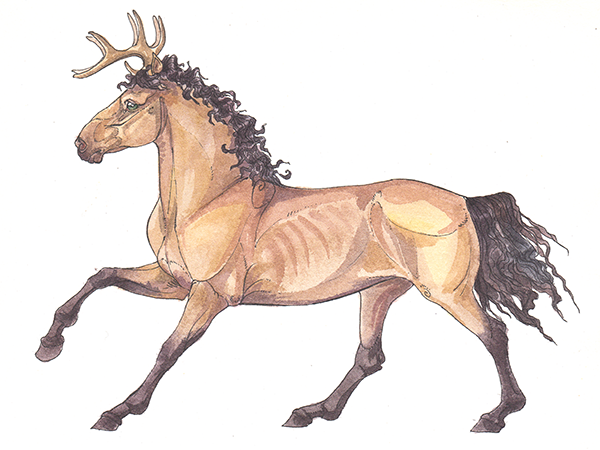
lysander
He chases her across the moonlit grasses like any god after a fleet-footed Anthousi with golden hair, trailing flowers and tears. But it is not the ichor-bloody heart of a god that drives Lysander to catch up with her - it is something else, something stronger and stranger. Yet for its newness he does not think of his new-feathered hope as a fragile thing, and no less holy than the rest of him.
At last she turns toward him, and waits like a bride beneath the silver light. Each unshed tear limns her eyes in diamond shine, sharp enough to cut, but the antlered stallion does not fear her edges. He is not dissuaded by her midwinter laugh; he only closes the distance between them, to feel the warmth of her, to share his warmth in turn.
In how many worlds, he wonders, has he gone to her beneath the stars? In how many will he? (None, he supposes, as long as it is he who bears her dagger).
He says nothing as she regards him, as she bends near to press her lips to the dagger. Her breath pricks at the skin of his chest and he inhales again the scent of her.
When her question comes he flicks an ear and his gaze on her is nothing but steady and ancient, deep as soil and green as new growth. “No,” he answers. “Child-like, in some ways, but that is a different thing.” Lysander does not elaborate; he can see all the words building up in the amethyst of her eyes and he is beginning to understand that not all wounds are physical, and not all healing is done with herbs and magic.
There is, too, his own folly to consider - desecrating a patron god’s temple was hardly the height of maturity. But Lysander would not be sorry for the things he had done, when fear for her had curdled to rage in his veins.
So when she continues he only listens, though his mouth presses firm and dark and thin at the mention of Raymond. What battles belong to him, what revenge is his to seek? He thinks of Calliope, of her talk of retribution, but Lysander only shifts his weight against the memory. It does not yet occur to him that these are secrets he perhaps should not keep from Florentine; he has spent so very long being responsible only to himself.
Oh, love is a vine that grows and winds, and not all things could be cut even with a silver dagger.
Her voice is cold silver with sorrow, and wounds him more deeply than a knife. When she steps nearer he wishes for arms to welcome her with; he wishes for wings to shelter her close. But Lysander has neither of these things, and so can only offer her the warmth of his body, the press of his shoulder, the brush of his lips against her neck, her cheek. “I would change nothing.” He says it like a vow into her ear. “When you are always starting over it is too easy not to learn anything. For a thousand years I never changed, and thought myself content.” Lysander’s voice is dry as autumn branches, his soft laugh like rattling leaves.
But his voice turns softer, then, and he tilts his head so that his gaze might catch hers, might hold it. “We have all the time we need, Florentine. But I would not waste any on regret.”
@
